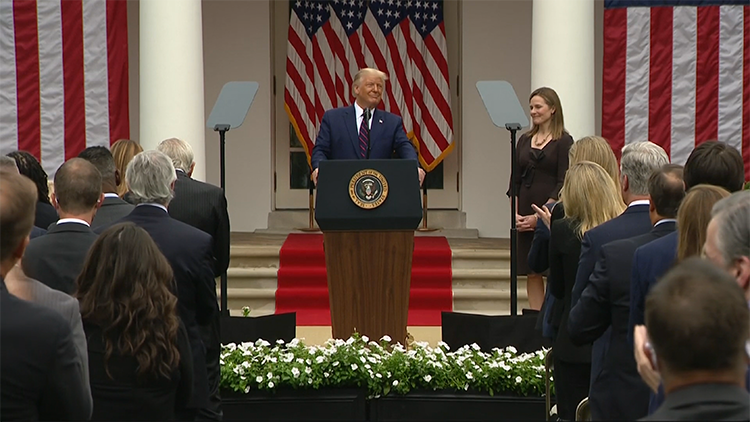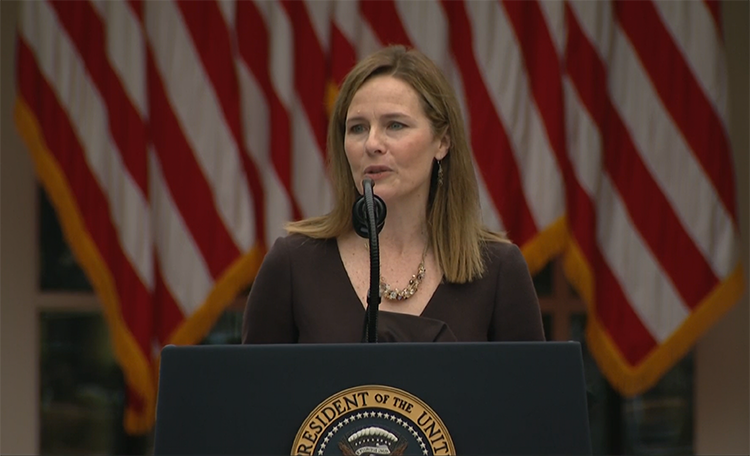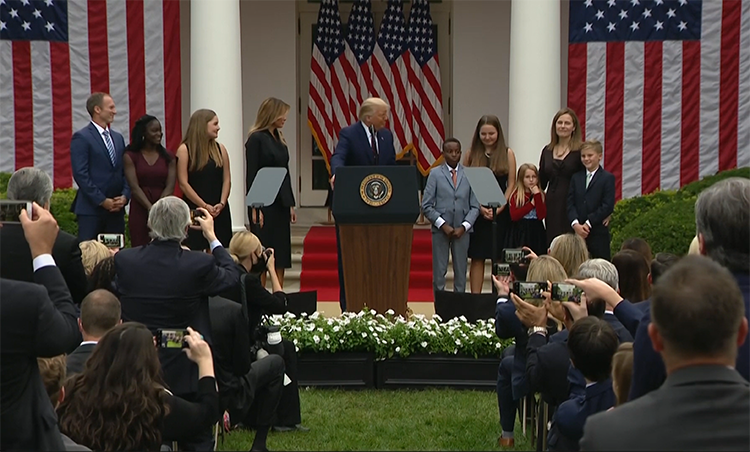Trump praises Judge Amy Coney Barrett's 'sterling credentials' as he nominates her to the Supreme Court

President Donald Trump announces that he is nominating Judge Amy Coney Barrett to the U.S. Supreme Court. Photos from screenshots of the press conference.
President Donald Trump announced on Saturday that he is nominating U.S. Circuit Judge Amy Coney Barrett to the U.S. Supreme Court to fill the vacancy created by the Sept. 18 death of Justice Ruth Bader Ginsburg.
Trump called Barrett “a woman of unparalleled achievement, towering intellect, sterling credentials and unyielding loyalty to the Constitution.”
Barrett’s husband and seven children were at the ceremony. The wife of the late Justice Antonin Scalia also attended.
Trump said Barrett’s qualifications “are unsurpassed, unsurpassed, and her record is beyond reproach. This should be a straightforward and prompt confirmation.”
He went on to say, “I’m sure it will be extremely noncontroversial. We said that the last time, didn’t we?” The comment was a reference to the confirmation hearing of Justice Brett M. Kavanaugh.
Barrett said she will do her best to demonstrate to U.S. senators considering her nomination that she is worthy of their support.
 Judge Amy Coney Barrett addresses the crowd.
Judge Amy Coney Barrett addresses the crowd.
“If the Senate does me the honor of confirming me I pledge to discharge the responsibilities of this job to the very best of my ability,” Barrett said. “I love the United States and I love the United States Constitution. I am truly humbled by the prospect of serving on the United States Supreme Court.”
Barrett noted the presence of the wife of Scalia, for whom she served as a law clerk. The lessons she learned from Scalia still resonate, Barrett said.
“His judicial philosophy is mine too,” she said. “A judge must apply the law as written. Judges are not policy makers, and they must be resolute in setting aside any policy views they may hold.”
Barrett also acknowledged Ginsburg’s contributions. “She not only broke glass ceilings, she smashed them,” Barrett said.
In his introduction, Trump said Barrett will be the first mother of school-age children on the U.S. Supreme Court. Barrett noted she will be among nine justices if confirmed, just as she is part of a nine-member family.
Barrett said she has been a pool driver, a party planner and co-principal with her husband of the “Barrett e-learning academy” during the COVID-19 pandemic.
She credited her husband for helping her manage a full life. He does far more than his share of work, despite a busy law practice, and is considered the better cook, she said.
Trump previously appointed Barrett to the Chicago-based 7th U.S. Circuit Court of Appeals, where she has served since 2017. If confirmed, 48-year-old Barrett would be the youngest justice on the Supreme Court, according to profiles by NPR and the Chicago Tribune.
Barrett, a summa cum laude graduate of the University of Notre Dame Law School, clerked for Scalia and for Judge Laurence Silberman of the U.S. Court of Appeals for the D.C. Circuit. While clerking for Scalia, she was nicknamed “the Coneator” by fellow clerks because of her reputation for crushing bad legal arguments, according to a Tribune profile.
Barrett was an associate at Miller, Cassidy, Larroca & Lewin beginning in 1999, Law.com reports. The firm merged with Baker Botts in 2001, and Barrett left the firm the next year. She was among the firm’s lawyers representing George W. Bush in Bush v. Gore, the Supreme Court case that effectively paved the way for Bush to assume the presidency.
Barrett became a member of Notre Dame’s law faculty in 2002, teaching in the areas of federal courts, constitutional law and statutory interpretation.
Notre Dame colleagues and Barrett’s former fellow clerks describe her as both brilliant and humble, according to a New York Post op-ed. According to the New York Times, she has been described as a textualist who interprets the law based on its plain words and an originalist who interprets the Constitution according to its original meaning.
Barrett was raised in the New Orleans suburb of Metairie, Louisiana. Her father was an oil company lawyer. Some publications describe Barrett’s mother as a homemaker, while the South Bend Tribune says she was a high school French teacher.
Barrett’s husband, Jesse Barrett, is a adjunct law professor at the University of Notre Dame Law School, a lawyer in private practice and a former federal prosecutor. The couple’s seven children include two who were adopted from Haiti and a child with special needs.
 The family of Judge Amy Coney Barrett ascended the stage along with President Donald Trump and first lady Melania Trump.
The family of Judge Amy Coney Barrett ascended the stage along with President Donald Trump and first lady Melania Trump.
Following the president’s announcement, ABA President Trish Refo released a statement announcing that the ABA Standing Committee on the Federal Judiciary “will immediately start its independent, nonpartisan peer evaluation of the nominee. The ABA Standing Committee will proceed as expeditiously as possible to complete this process and will do so in a thorough and fair manner.
“For the past 67 years, the ABA Standing Committee on the Federal Judiciary has conducted comprehensive peer reviews of the professional qualifications of federal judicial nominees, including all 34 U.S Supreme Court nominees,” Refo continued. “The standing committee, which operates wholly independently of the American Bar Association, evaluates nominees using information provided by knowledgeable judges, lawyers and other colleagues about the nominee’s professional competence, integrity and judicial temperament. The committee does not consider the nominee’s philosophy, political affiliation or ideology. Based on this information, the Standing Committee publicly releases a rating of each federal judicial nominee as either Well Qualified, Qualified or Not Qualified.
“While it is important to fill any vacancy to the Supreme Court in a timely manner, the Senate process of advice and consent must allow adequate time for thorough consideration of the nomination of Barrett and must not be rushed due to partisan considerations. That is essential to the process of assessing lifetime appointments to the highest court in the United States. For the nation to continue to have trust in the integrity and independence of the federal judiciary, the process that places judges on the bench must be viewed as fair, unhurried and unbiased,” Refo concluded.
A majority of the ABA Standing Committee on the Federal Judiciary gave Barrett a “well qualified” rating when she was nominated to the 7th Circuit. A committee minority gave her a “qualified” rating. More information on the standing committee’s process is available in this in-depth backgrounder and in this article from the January 2018 issue of the ABA Journal.
During her 2017 confirmation hearings, Barrett was questioned about a 1998 law review article she wrote with a Notre Dame law professor when she was a law student. The article discussed the Catholic church’s position on the death penalty and considered whether Catholic judges should recuse themselves in capital cases.
U.S. Sen. Dianne Feinstein, D-Calif., mentioned the article when probing whether Barrett’s Catholic religious views would lead her to overturn Roe v. Wade. “The conclusion one draws is that the dogma lives loudly within you,” Feinstein had said. The phrase was later printed on T-shirts and coffee mugs, as some Catholics saw it as a badge of faith.
Feinstein was also questioned Barrett about a 2013 law review article in which she cited the view that stare decisis “ is not a hard-and-fast rule” in the Supreme Court’s constitutional cases.
“I tend to agree with those who say that a justice’s duty is to the Constitution and that it is thus more legitimate for her to enforce her best understanding of the Constitution rather than a precedent she thinks clearly in conflict with it,” she wrote.
Barrett said during her 7th Circuit confirmation hearing that she saw no conflict between religious faith and judicial duties. “I would never impose my own personal convictions upon the law,” she said.
See also:
ABAJournal.com: “A top SCOTUS contender, Amy Coney Barrett is likely to draw scrutiny for decisions on abortion, campus sex assault”
Write a letter to the editor, share a story tip or update, or report an error.


